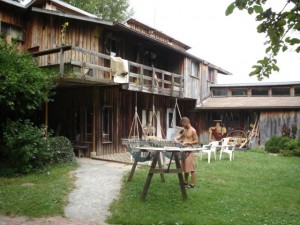The opening of “The Other American Dream,” Tamara Jones’ 1998 article in the Washington Post about Twin Oaks, a 1960s Virginia commune that neither burned out nor faded away, but instead survived to confront its own midlife crisis:
“To get there, follow the winding road past shadowed woods and sunlit fields, past the tiny church with its tall steeple, past the eerie old mill and listless river, until finally you come upon the sign that taunts: ‘If you lived at Twin Oaks, you’d be home now.’ Venture through the gate, down the dirt driveway to the white clapboard farmhouse, which is precisely where the path ends and the journey began.
Kat Kinkade remembers being so excited that first day that she couldn’t decide where to start, so she grabbed an old broom and began sweeping the chicken house, making a compost pile of the filth. At 36, she was a bored secretary banking not just her future but her entire identity on a slim novel she had read in night school. Seven other people, including Kat’s new husband and her teenage daughter, moved with her that day to rural Louisa County, Virginia, where they had leased a modest farm. The year was 1967, and as Vietnam exploded and racial violence bloodied streets across America, this small, misbegotten group of dropouts, visionaries, drifters and seekers began working on an exquisitely detailed plan to change the world.
Twin Oaks was one of thousands of communes to sprout across a restive America in the ’60s and ’70s, emblems of hope and hubris. Most would disappear unnoticed. Twin Oaks was different, though. Against all odds, it managed to flourish, growing from eight people to nearly 100, becoming not merely self-sustaining but successful, a land trust sprawling across 450 efficiently managed acres to form what is surely one of the last bastions of pure communism in the modern world. From each according to ability, to each according to need. No one goes hungry or cold. Everyone is employed. The children are joyful. Competition, materialism and wastefulness are rare. Violence is forbidden; ambition quelled. Admirable goals have been achieved, and it would be easy to assume that happiness prevails. But reality is always more complex.
Which is why Twin Oaks, in its plump and improbable middle age, now finds itself searching so fervently for all the dreams that got lost, somehow, on the way to Utopia.”

